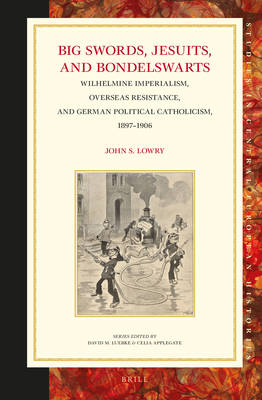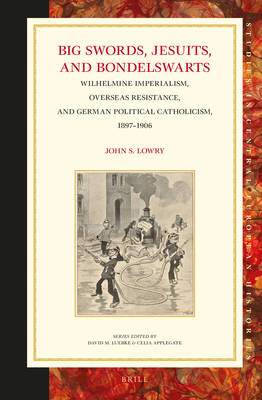
Bedankt voor het vertrouwen het afgelopen jaar! Om jou te bedanken bieden we GRATIS verzending (in België) aan op alles gedurende de hele maand januari.
- Afhalen na 1 uur in een winkel met voorraad
- In januari gratis thuislevering in België
- Ruim aanbod met 7 miljoen producten
Bedankt voor het vertrouwen het afgelopen jaar! Om jou te bedanken bieden we GRATIS verzending (in België) aan op alles gedurende de hele maand januari.
- Afhalen na 1 uur in een winkel met voorraad
- In januari gratis thuislevering in België
- Ruim aanbod met 7 miljoen producten
Zoeken
Big Swords, Jesuits, and Bondelswarts
Wilhelmine Imperialism, Overseas Resistance, and German Political Catholicism, 1897-1906
John S Lowry
€ 169,46
+ 338 punten
Omschrijving
In Big Swords, Jesuits, and Bondelswarts, John S. Lowry demonstrates that anti-imperialist resistance movements overseas significantly shaped the course of Wilhelmine domestic politics between 1897 and 1906. In 1898 and 1900, for example, the consequences of Chinese, Cuban, and Samoan resistance permitted Berlin to steer two large naval laws through the Reichstag by enabling the government to garner critical votes from the Catholic Center Party through pro-Catholic gestures overseas, rather than via repeal of the Anti-Jesuit Law at home. By contrast, after 1903 costly uprisings throughout German-occupied Africa generated acute fiscal concerns among Center Party delegates, and African civilian protests against colonial misrule aroused missionary and Centrist ire. Lowry emphasizes that the ensuing Reichstag dissolution of 1906 arose much more directly from African factors than previous scholarship has recognized.
Specificaties
Betrokkenen
- Auteur(s):
- Uitgeverij:
Inhoud
- Aantal bladzijden:
- 400
- Taal:
- Engels
- Reeks:
- Reeksnummer:
- nr. 62
Eigenschappen
- Productcode (EAN):
- 9789004233843
- Verschijningsdatum:
- 20/11/2015
- Uitvoering:
- Hardcover
- Formaat:
- Genaaid
- Afmetingen:
- 163 mm x 241 mm
- Gewicht:
- 762 g

Alleen bij Standaard Boekhandel
+ 338 punten op je klantenkaart van Standaard Boekhandel
Beoordelingen
We publiceren alleen reviews die voldoen aan de voorwaarden voor reviews. Bekijk onze voorwaarden voor reviews.









